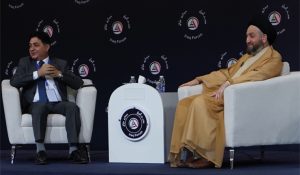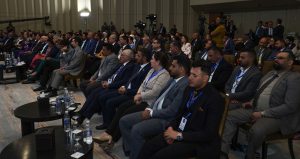- Ammar Al-Hakim, Al-Hikma Movement
- Talib Muhammad, Al-Mustansiriyah University (Moderator)
The Moderator, Talib Muhammad Karim, opened the session by asking about Iraq’s position on the path of state-building. Ammar al-Hakim, the leader of the Al-Hikma Movement, began the dialogue by presenting his ideas on the main factors necessary to create a strong and successful Iraqi state, including the identity that has not yet been settled between the Iraqi actors, the equation of governance with the internal balances of power, the institutional character of governance while combating corruption, the values that the state needs to face its problems with, and the regional and international relations that affect us and vice versa.
He emphasised that Iraq needs a diverse economy fuelled by different sources – such as tourism, technology, and agriculture – and less dependent on oil. “It takes time for nations to move on from one regime to another,” he told the audience, suggesting that twenty years is not such a long time in comparison to other countries who have gone through similar transitions. “Iraq is now on the right way to be on the right track,” he said. Even if others might say the transition to stability is going too slow, Hakim continued, Iraq is safer. The more ties and stronger international relationships the country has, the further along the way Iraq will be to building a strong state, he said.
Al-Hakim explained that according to what the constitution has defined, the path is determined, but the problem is in its implementation. The problem is that the constitution talks about a reality and the application shows another. But how do we unite our daily behavior with the vision defined by the Constitution? The greater the collective awareness and level of political maturity, the closer the two paths will be to each other. The failures that have occurred have uncovered facts that are not were as well-known as they are now.

Now, after twenty years, the signs of stability are appearing to the surface, in terms of society and security, Al-Hakim said. There are more promising economic opportunities, he added, for example now Iraq is finalising one of the largest budgets both in the country’s history and in the region. The Al-Sudani government programme and the Prime Minister’s insistence on following it and using it as a compass to lead the government by referring to it often is considered a different approach to the previous government. “This is a huge progress,” he said, praising the programme for paving a clear road and calling it the way that the country should be governed.
Asked about the debate that suggests the system of government set up after 2003 has run its course and needed fundamental change, Al-Hakim used the Tishreen Movement as an example to argue the opposite. “The current regime has embraced the Tishreen Movement and provided a space for the emerging political groups to contribute to the decision-making process,” Al-Hakim told the audience. “Now the new politicians from Tishreen are preparing for upcoming elections.”

Iraq Forum: For Stability and Prosperity
3/05/2023
S5: State-building in the Eyes of Iraq’s Political Leaders: Open Debates.
Session video

